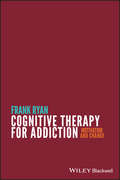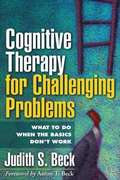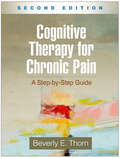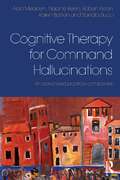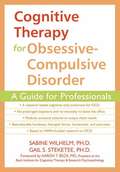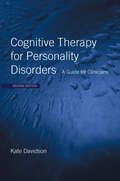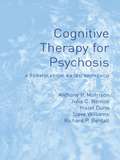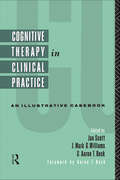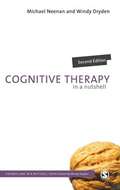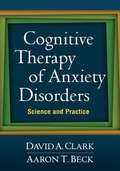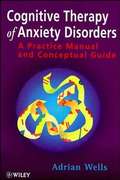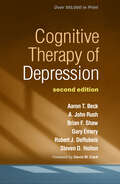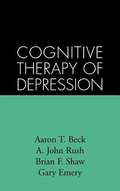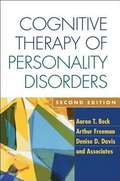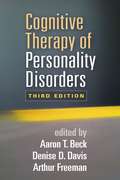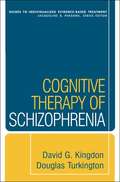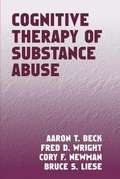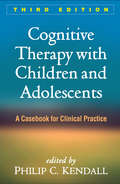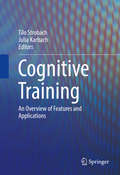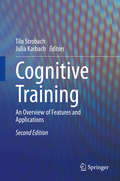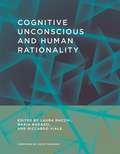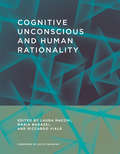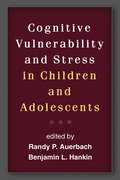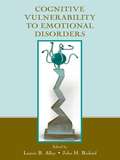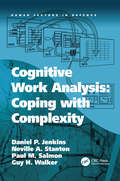- Table View
- List View
Cognitive Therapy for Addiction
by Frank RyanAn innovative new approach to addiction treatment that pairs cognitive behavioural therapy with cognitive neuroscience, to directly target the core mechanisms of addiction.Offers a focus on addiction that is lacking in existing cognitive therapy accountsUtilizes various approaches, including mindfulness, 12-step facilitation, cognitive bias modification, motivational enhancement and goal-setting and, to combat common road blocks on the road to addiction recoveryUses neuroscientific findings to explain how willpower becomes compromised-and how it can be effectively utilized in the clinical arena
Cognitive Therapy for Challenging Problems
by Judith BeckThis groundbreaking book addresses what to do when a patient is not making progress in cognitive-behavioral therapy. Provided is practical, step-by-step guidance on conceptualizing and solving frequently encountered problems, whether in developing and maintaining the therapeutic alliance or in accomplishing specific therapeutic tasks. While the framework presented is applicable to a range of challenging clinical situations, particular attention is given to modifying the longstanding distorted beliefs and dysfunctional behavioral strategies of people with personality disorders. Helpful appendices include a reproducible assessment tool, the Personality Belief Questionnaire.
Cognitive Therapy for Chronic Pain, Second Edition: A Step-by-Step Guide
by Beverly E. ThornThis go-to manual--now revised and significantly expanded with more than 50% new material--has enabled thousands of clinicians to effectively treat clients with chronic pain. The volume provides everything needed to implement 10 treatment modules that draw on proven cognitive-behavioral therapy (CBT) strategies. In a convenient large-size format, it includes 58 reproducible client handouts and assessment tools that purchasers can photocopy from the book or download and print from the companion website. The website also offers access to downloadable audio recordings of relaxation exercises narrated by the author, plus supplemental resources for treating clients with lower levels of literacy. New to This Edition *Incorporates over a decade of important advances in pain research and clinical practice. *Treatment modules that allow clients to enter a group at any point after an introductory session. *Expanded with motivational enhancement, relaxation, and mindfulness techniques. *Many new handouts, assessment tools, and therapist scripts, as well as audio downloads. *An accessible treatment rationale grounded in state-of-the-art brain research.
Cognitive Therapy for Command Hallucinations: An advanced practical companion
by Alan Meaden Karen Barton Sandra Bucci Nadine Keen Robert AstonAuditory hallucinations rank amongst the most treatment resistant symptoms of schizophrenia, with command hallucinations being the most distressing, high risk and treatment resistant of all. This new work provides clinicians with a detailed guide, illustrating in depth the techniques and strategies developed for working with command hallucinations. Woven throughout with key cases and clinical examples, Cognitive Therapy for Command Hallucinations clearly demonstrates how these techniques can be applied in a clinical setting. Strategies and solutions for overcoming therapeutic obstacles are shown alongside treatment successes and failures to provide the reader with an accurate understanding of the complexities of cognitive therapy. This helpful and practical guide with be of interest to clinical and forensic psychologists, cognitive behavioural therapists, nurses and psychiatrists.
Cognitive Therapy for Obsessive-Compulsive Disorder: A Guide for Professionals
by Aaron T. Beck Sabine Wilhelm Gail S. SteketeeTwo OCD experts provide therapists with a breakthrough treatment model employing purely cognitive treatment methods, proven effective for people with pure obsessions, harming, religious, and sexual obsessions, as well as checking and mental rituals.
Cognitive Therapy for Personality Disorders: A Guide for Clinicians
by Kate DavidsonIt is increasingly recognized that a significant number of individuals with personality disorders can benefit from therapy. In this new edition - based on the treatment of over a hundred patients with antisocial and borderline personality disorders - Kate Davidson demonstrates that clinicians using cognitive therapy can reduce a patient’s tendency to deliberately self-harm and to harm others; it also improves their psychological well-being. Case studies and therapeutic techniques are described as well as current evidence from research trials for this group of patients. Cognitive Therapy for Personality Disorders provides a thorough description of how to apply cognitive behavioural therapy to patients who are traditionally regarded as being difficult to treat: those with borderline personality disorders and those with antisocial personality disorders. The book contains detailed descriptions and strategies of how to: formulate a case within the cognitive model of personality disorders overcome problems encountered when treating personality disordered patients understand how therapy may develop over a course of treatment. This clinician’s guide to cognitive behavioural therapy in the treatment of borderline and antisocial personality disorder will be essential reading for psychiatrists, clinical and counselling psychologists, therapists, mental health nurses, and students on associated training courses.
Cognitive Therapy for Psychosis: A Formulation-Based Approach
by Steve Williams Richard Bentall Julia Renton Anthony Morrison Hazel DunnCognitive Therapy for Psychosis provides clinicians with a comprehensive cognitive model that can be applied to all patients with schizophrenia and related disorders in order to aid the development of a formulation that will incorporate all relevant factors. It illustrates the process of assessment, formulation and intervention and highlights potential difficulties arising from work with patients and how they can be overcome.Experienced clinicians write assuming no prior knowledge of the area, covering all of the topics of necessary importance including:* an introduction to cognitive theory and therapy* difficulties in engagement and the therapeutic relationship* how best to utilise homework with people who experience psychosis* relapse prevention and management.Illustrated by excerpts from therapy sessions, this book digests scientific evidence and theory but moreover provides clinicians with essential practical advice about how to best aid people with psychoses.
Cognitive Therapy in Clinical Practice: An Illustrative Casebook
by Aaron T. Beck Jan Scott J.Mark G.WilliamsThis volume contains examples of how cognitive therapists working in varied settings with groups of adult clients have applied the cognitive model in their domain. Cognitive therapy has much broader application than the traditional area of depression; contributors illustrate the way they work by using extended case material, readers will hear the voices of the clients and empathise with both client and therapist as they seek to build a collaborative relationship. Areas discussed range from drug abuse and eating disorders to obsessive behaviour. Any therapist, however experienced, will learn from `listening in' on the cases presented and students will find it essential reading.
Cognitive Therapy in a Nutshell (Counselling in a Nutshell)
by Windy Dryden Michael NeenanCognitive Behavioural Therapy in a Nutshell - Second Edition is a concise introduction to one of the most widely-practised approaches to counselling and psychotherapy. Leading authors, Michael Neenan and Windy Dryden, explain the model and the core techniques used during the therapeutic process to: - elicit and examine negative automatic thoughts - uncover and explore underlying assumptions, rules and core beliefs (schemas); and - maintain gains from therapy. For newcomers to the subject, this revised and updated edition of Cognitive Therapy in a Nutshell provides the ideal place to start and a springboard to further study.
Cognitive Therapy of Anxiety Disorders
by David Clark Aaron BeckUpdating and reformulating Aaron T. Beck's pioneering cognitive model of anxiety disorders, this book is both authoritative and highly practical. The authors synthesize the latest thinking and empirical data on anxiety treatment and offer step-by-step instruction in cognitive assessment, case formulation, cognitive restructuring, and behavioral intervention. They provide evidence-based mini-manuals for treating the five most common anxiety disorders panic disorder, social phobia, generalized anxiety disorder, obsessive-compulsive disorder, and posttraumatic stress disorder. User-friendly features include vivid case examples, concise "Clinician Guidelines" that reinforce key points, and over three dozen reproducible handouts and forms.
Cognitive Therapy of Anxiety Disorders
by Adrian WellsCognitive therapies are based on the idea that behavior and emotions result largely from an individual's appraisal of a situation, and are therefore influenced by that individual's beliefs, assumptions and images. This book is a comprehensive guide to cognitive therapy of anxiety disorders.
Cognitive Therapy of Depression
by Aaron T. Beck Brian F. Shaw A. John Rush Gary Emery Steven D. Hollon Robert J. DeRubeisReflecting major contemporary developments in theory and clinical practice, the second edition of this authoritative guide has been significantly rewritten with 85% new material. Cognitive therapy (CT) pioneer Aaron T. Beck and associates provide cutting-edge knowledge about the cognitive model of depression and the most effective, lasting ways to reduce clients' suffering. The volume links clearly explained theoretical principles to specific therapeutic strategies. Techniques for identifying, examining, and changing the thoughts, beliefs, and behaviors that give rise to depression and related disorders are illustrated with compelling vignettes and sample dialogues. New to This Edition *Reflects the maturation of CT for treating more complicated presentations, including patients with chronic depression or underlying personality disorders. *Brings therapists up to date on schema-focused approaches as well as classic cognitive and behavioral interventions. *Incorporates data from basic research and many dozens of clinical trials. *All-new vignettes and a chapter-length case example. *Greater attention to the therapeutic relationship and to longer-term treatment.
Cognitive Therapy of Depression
by Aaron T. BeckClassic in psychology. Discusses the cognitive behavioral perspectives of treating depression.
Cognitive Therapy of Personality Disorders, Second Edition
by Aaron Beck Arthur FreemanThis landmark work was the first to present a cognitive framework for understanding and treating personality disorders. Part I lays out the conceptual, empirical, and clinical foundations of effective work with this highly challenging population, reviews cognitive aspects of Axis II disorders, and delineates general treatment principles. In Part II, chapters detail the process of cognitive-behavioral therapy for each of the specific disorders, review the clinical literature, guide the therapist through diagnosis and case conceptualization, and demonstrate the nuts and bolts of cognitive intervention. New to This Edition Over a decade's worth of tremendous advances in theory and practice. Chapters covering assessment procedures and issues in the therapeutic relationship, including a wealth of information on therapeutic impasses and how to overcome them. Restructured to follow a consistent format. Expanded case material.
Cognitive Therapy of Personality Disorders, Third Edition
by Aaron T. Beck Denise D. Davis Edd Arthur FreemanThis widely used practitioner resource and training tool is the definitive work on understanding and treating personality disorders from a cognitive-behavioral therapy (CBT) perspective. The prominent editors and contributors explain the nature of personality disorders and why they are so challenging to treat. Chapters addressing 12 specific disorders are organized around vivid, instructive clinical examples. The book provides up-to-date scientific knowledge about each disorder and describes effective strategies for differential diagnosis, case conceptualization, implementing individualized CBT interventions, and overcoming roadblocks. New to This Edition *Incorporates cutting-edge clinical approaches and research; expands the cognitive theory of personality disorder. *Chapters on neural mechanisms, cultural diversity issues, and depressive personality disorder. *Chapters on co-occurring disorders and management of clinical challenges. *Disorder-specific chapters now include sections on key treatment goals, progress and termination, and clinician self-care. *Discusses DSM-5 concepts and diagnostic criteria. *Reviews advances in assessing personality beliefs.
Cognitive Therapy of Schizophrenia
by David Kingdon Douglas TurkingtonDrawing on the authors' decades of influential work in the field, this highly practical volume presents an evidence-based cognitive therapy approach for clients with schizophrenia. Guidelines are provided for collaborative assessment and case formulation that enable the clinician to build a strong therapeutic relationship, establish reasonable goals, and tailor treatment to each client's needs. Described in thorough, step-by-step detail are effective techniques for working with delusional beliefs, voices, visions, thought disorders, and negative symptoms; integrating cognitive therapy with other forms of treatment; reducing relapse risks; and enhancing client motivation. Special features include reproducible client handouts and assessment tools.
Cognitive Therapy of Substance Abuse
by Aaron T. Beck Fred D. WrightCognitive therapy offers a well-documented and cost-effective psychosocial treatment model for working with substance abuse disorders. Comprehensive and accessible, this volume clearly details the cognitive model of addiction, the specifics of case formulation, management of the therapeutic relationship, and the structure of the therapy sessions. It discusses how to educate patients in the treatment model and procedures and manage their cravings and urges for drugs and alcohol. Specific cognitive and behavioral strategies and techniques are described in detail, as are methods for understanding and working with patients who present concomitant problems of depression, anxiety, low frustration tolerance, anger, and personality disorders. Also addressed are such significant issues as crisis management and relapse prevention. Enhancing the utility of the volume are appendices featuring sample client inventories and checklists. These forms are designed to help the clinician identify targets for intervention, track progress over time, and develop an individualized relapse prevention plan for each client.
Cognitive Therapy with Children and Adolescents, Third Edition: A Casebook for Clinical Practice
by Philip C. KendallThousands of clinicians and students have turned to this casebook--now completely revised with 90% new material--to see what cognitive-behavioral therapy (CBT) looks like in action with the most frequently encountered child and adolescent disorders. Concise and accessible, the book is designed for optimal clinical utility. Leading scientist-practitioners provide a brief overview of each clinical problem and its assessment and management. Chapters are organized around one or more detailed case examples that demonstrate how to build rapport with children and families; plan effective, age-appropriate treatment; and deliver evidence-based interventions using a variety of therapeutic strategies and materials. (Prior edition editors: Mark A. Reinecke, Frank M. Dattilio, and Arthur Freeman.) New to This Edition *Most chapters are new, reflecting nearly 15 years of advances in theory and research. *Additional chapter topics: generalized anxiety disorder and family-based treatment of adolescent substance abuse. *Streamlined, more concise format makes the book even more user friendly for busy clinicians. *Increased attention to cultural considerations and transdiagnostic treatment strategies.
Cognitive Training: An Overview of Features and Applications
by Tilo Strobach Julia KarbachCognitive training is a dynamically and fast growing research area that is This book brings together a cutting edge international team of contributors to critically review the current knowledge regarding the effectiveness of training interventions designed to improve cognitive functions in different target populations. There is substantial evidence that cognitive and physical training can improve cognitive performance, but these benefits seem to vary as a function of the type and the intensity of interventions and the way training-induced gains are measured and analyzed. This book further fulfills the need for clarification of the mechanisms underlying cognitive and neural changes occurring after training. This book offers a comprehensive overview of empirical findings and methodological approaches of cognitive training research in different cognitive domains (memory, executive functions, etc. ), types of training (working memory training, video game training, physical training, etc. ), age groups (from children to young and older adults), target populations (children with developmental disorders, aging workers, MCI patients etc. ), settings (laboratory-based studies, applied studies in clinical and educational settings), and methodological approaches (behavioral studies, neuroscientific studies). Chapters feature theoretical models that describe the mechanisms underlying training-induced cognitive and neural changes. Cognitive Training: An Overview of Features and Applications will be of interest to researchers, practitioners, students, and professors in the fields of psychology and neuroscience.
Cognitive Training: An Overview of Features and Applications
by Tilo Strobach Julia KarbachThe second edition of this book brings together a cutting edge international team of contributors to critically review the current knowledge regarding the effectiveness of training interventions designed to improve cognitive functions in different target populations. Since the publication of the first volume, the field of cognitive research has rapidly evolved. There is substantial evidence that cognitive and physical training can improve cognitive performance, but these benefits seem to vary as a function of the type and the intensity of interventions and the way training-induced gains are measured and analyzed. This book will address the new topics in psychological research and aims to resolve some of the currently debated issues. This book offers a comprehensive overview of empirical findings and methodological approaches of cognitive training research in different cognitive domains (memory, executive functions, etc.), types of training (working memory training, video game training, physical training, etc.), age groups (from children to young and older adults), target populations (children with developmental disorders, aging workers, MCI patients etc.), settings (laboratory-based studies, applied studies in clinical and educational settings), and methodological approaches (behavioral studies, neuroscientific studies). Chapters feature theoretical models that describe the mechanisms underlying training-induced cognitive and neural changes.Cognitive Training: An Overview of Features and Applications, Second Edition will be of interest to researchers, practitioners, students, and professors in the fields of psychology and neuroscience.
Cognitive Unconscious and Human Rationality
by Keith Frankish Riccardo Viale Laura Macchi Maria BagassiThis volume contributes to a current debate within the psychology of thought that has wide implications for our ideas about creativity, decision making, and economic behavior. The essays focus on the role of implicit, unconscious thinking in creativity and problem solving, the interaction of intuition and analytic thinking, and the relationship between communicative heuristics and thought. The analyses move beyond the conventional conception of mind informed by extra-psychological theoretical models toward a genuinely psychological conception of rationality -- a rationality no longer limited to conscious, explicit thought, but able to exploit the intentional implicit level.The contributors consider a new conception of human rationality that must cope with the uncertainty of the real world; the implications of abandoning the normative model of classic logic and adopting a probabilistic approach instead; the argumentative and linguistic aspects of reasoning; and the role of implicit thought in reasoning, creativity, and its neurological base.ContributorsMaria Bagassi, Linden J. Ball, Jean Baratgin, Aron K. Barbey, Tilmann Betsch, Eric Billaut, Jean-François Bonnefon, Pierre Bonnier, Shira Elqayam, Keith Frankish, Gerd Gigerenzer, Ken Gilhooly, Denis Hilton, Anna Lang, Stefanie Lindow, Laura Macchi, Hugo Mercier, Giuseppe Mosconi, Ian R. Newman, Mike Oaksford, David Over, Guy Politzer, Johannes Ritter, Steven A. Sloman, Edward J. N. Stupple, Ron Sun, Nicole H. Therriault, Valerie A. Thompson, Emmanuel Trouche-Raymond, Riccardo Viale
Cognitive Unconscious and Human Rationality
by Riccardo Viale Laura Macchi Maria BagassiExamining the role of implicit, unconscious thinking on reasoning, decision making, problem solving, creativity, and its neurocognitive basis, for a genuinely psychological conception of rationality. This volume contributes to a current debate within the psychology of thought that has wide implications for our ideas about creativity, decision making, and economic behavior. The essays focus on the role of implicit, unconscious thinking in creativity and problem solving, the interaction of intuition and analytic thinking, and the relationship between communicative heuristics and thought. The analyses move beyond the conventional conception of mind informed by extra-psychological theoretical models toward a genuinely psychological conception of rationality—a rationality no longer limited to conscious, explicit thought, but able to exploit the intentional implicit level.The contributors consider a new conception of human rationality that must cope with the uncertainty of the real world; the implications of abandoning the normative model of classic logic and adopting a probabilistic approach instead; the argumentative and linguistic aspects of reasoning; and the role of implicit thought in reasoning, creativity, and its neurological base.ContributorsMaria Bagassi, Linden J. Ball, Jean Baratgin, Aron K. Barbey, Tilmann Betsch, Eric Billaut, Jean-François Bonnefon, Pierre Bonnier, Shira Elqayam, Keith Frankish, Gerd Gigerenzer, Ken Gilhooly, Denis Hilton, Anna Lang, Stefanie Lindow, Laura Macchi, Hugo Mercier, Giuseppe Mosconi, Ian R. Newman, Mike Oaksford, David Over, Guy Politzer, Johannes Ritter, Steven A. Sloman, Edward J. N. Stupple, Ron Sun, Nicole H. Therriault, Valerie A. Thompson, Emmanuel Trouche-Raymond, Riccardo Viale
Cognitive Vulnerability and Stress in Children and Adolescents
by Randy P Auerbach Benjamin L. HankinPresenting cutting-edge research conducted with children, adolescents, and their caregivers, this e-book examines cognitive factors in the development of psychopathology. Investigators at the forefront of the field discuss different types of cognitive vulnerability and their links to depression, anxiety, and externalizing symptoms. Also addressed is how cognitive vulnerability itself develops, including the role of child-parent interactions, maternal depression, and physiological processes. Innovative assessment approaches are described. This material was originally published as a special section of the International Journal of Cognitive Therapy (Vol. 5, No. 3, 2012), editor, John H. Riskind, PhD.
Cognitive Vulnerability to Emotional Disorders
by John H. Riskind Lauren B. AlloyEmotional disorders such as anxiety, depression, and dysfunctional patterns of eating are clearly among the most devastating and prevalent confronting practitioners, and they have received much attention from researchers--in personality, social, cognitive, and developmental psychology, as well as in clinical psychology and psychiatry. A major recent focus has been cognitive vulnerability, which seems to set the stage for recurrences of symptoms and episodes. In the last five years there has been a rapid proliferation of studies.In this book, leading experts present the first broad synthesis of what we have now learned about the nature, of cognitive factors that seem to play a crucial role in creating and maintaining vulnerability across the spectrum of emotional disorders. An introductory chapter considers theory and research design and methodology and constructs a general conceptual framework for understanding and studying the relationships between developmental and cognitive variables and later risk, and the difference between distal cognitive antecedents of disorders (e.g. depressive inferential styles, dysfunctional attitudes) and proximal ones (e.g. schema activation or inferences). Subsequent chapters are organized into three sections, on mood, anxiety, and eating disorders. Each section ends with an integrative overview chapter that offers both incisive commentary and insightful suggestions for further systematic research.A rich resource for all those professionally concerned with these problems, Cognitive Vulnerability to Emotional Disorders advances both clinical science and clinical practice.
Cognitive Work Analysis: Coping With Complexity (Human Factors in Defence)
by Daniel P. Jenkins Neville A. Stanton Guy H. Walker'Complex sociotechnical systems' are systems made up of numerous interacting parts, both human and non-human, operating in dynamic, ambiguous and safety critical domains. Cognitive Work Analysis (CWA) is a structured framework specifically developed for considering the development and analysis of these complex socio-technical systems. Unlike many human factors approaches, CWA does not focus on how human-system interaction should proceed (normative modelling) or how human-system interaction currently works (descriptive modelling). Instead, through a focus on constraints, it develops a model of how work can be conducted within a given work domain, without explicitly identifying specific sequences of actions (formative modelling). The framework leads the analyst to consider the environment the task takes place within, and the effect of the imposed constraints on the way work can be conducted. It provides guidance through the process of answering the questions of why the system exists, what activities can be conducted within the domain as well as how these activities can be achieved, and who can perform them. The first part of the book contains a comprehensive description of CWA, introducing it to the uninitiated. It then presents a number of applications in complex military domains to explore and develop the benefits of CWA. Unlike much of the previous literature, particular attention is placed on exploring the CWA framework in its entirety. This holistic approach focuses on the system environment, the activity that takes place within it, the strategies used to conduct this activity, the way in which the constituent parts of the system (both human and non-human) interact and the behaviour required. Each stage of this analysis identifies the constraints governing the system; it is contended that through this holistic understanding of constraints, recommendations can be made for the design of system interaction; increasing the ability of users to cope with unanticipated, unexpected situations. This book discusses the applicability of the approach in system analysis, development and evaluation. It provides process to what was previously a loosely defined framework.
